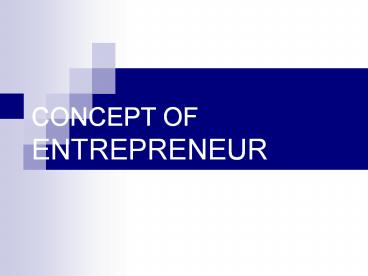CONCEPT OF ENTREPRENEUR - PowerPoint PPT Presentation
Title:
CONCEPT OF ENTREPRENEUR
Description:
Individual / Group arranges Finance and Bears Risks. State Entrepreneur. Ventures undertaken by the State or Government. Joint Entrepreneur. – PowerPoint PPT presentation
Number of Views:164
Avg rating:3.0/5.0
Title: CONCEPT OF ENTREPRENEUR
1
CONCEPT OF ENTREPRENEUR
2
- According to International Labour Organisation
( ILO ) entrepreneur are people who have the
ability to see and evaluate business
oppurtunities, together the necessary resources
to take advantage of them, and to initiate
appropriate action to ensure success.
3
Characteristics of Entrepreneur
- Calculated Risks.
- Innovator.
- Organiser.
- Creator.
- Achievement motivated.
- Technically competent.
- Self Confidant.
- Socially Responsible.
- Optimistic.
- Equipped with Capability to Drive.
4
- Blessed with Mental Ability.
- Human Relation Ability.
- Communication Ability.
- Decision Making.
- Business Planning.
- Venture Capitalist.
- Visionary.
- Entrepreneurs make significant differences.
- Ability to Spot and Exploit opportunities.
- Courage to face Adversities.
- Leadership.
5
Types of Entrepreneurs
- (A) According to Type of Business
- Business Entrepreneur
- Conceive the Idea of New Product.
- Arrangement of Resources.
- Trading Entrepreneur.
- Involves in Trading Activities and not
Manufacuring. - Industrial Entrepreneur.
- Sets up an industrial Unit.
- Corporate Entrepreneur.
- Who Plans, Develops and Manages a Corporate
Body. - Agricultural Entrepreneur.
- Engaged in agricultural Activities.
6
- (B) According to Motivation.
- Pure Entrepreneur.
- Tempted by the monetary rewards or Profits.
- Induced Entrepreneur.
- Attracted by the incentives, subsidies and
facilities offered by the Government.
7
- (C) According to the use of Technology.
- Technical Entrepreneur.
- Posses Craftsman skills which he uses to develop
and to improve the technical aspect of the
product. - Non-Technical Entrepreneur.
- Spends time to develop alternative, strategies of
marketing and distribution to promote his
business. - Professional Entrepreneur.
- He initiates sells the business and float new
business.
8
- (D) According to Stages of Development.
- First Generation Entrepreneur.
- No Entrepreneurial Background.
- Second Generation Entrepreneur.
- Inherited the family business.
- Classical Entrepreneur.
- Survival of the unit with or without an element
of Growth.
9
- (E) According to Danhof.
- Innovative Entrepreneur.
- Putting attractive possibilities into Practice.
- Imitative Entrepreneur.
- Initiate Techniques and Technologies.
- Fabian Entrepreneur.
- Imitate when realise that otherwise they will be
at Loss. - Drone Entrepreneur.
- Not ready to make changes into the existing
Production methods.
10
- (F) According to Capital Ownership.
- Private Entrepreneur.
- Individual / Group arranges Finance and Bears
Risks. - State Entrepreneur.
- Ventures undertaken by the State or Government.
- Joint Entrepreneur.
- Combination of Private entrepreneur and State
entrepreneur who joins hands.
11
- (G) According to Gender and Age.
- Man Entrepreneur.
- Woman Entrepreneur.
- Young Entrepreneur.
- Old Entrepreneur.
- Middle Aged Entrepreneur.
- (H) According to Area.
- Urban Entrepreneur.
- Rural Entrepreneur.
12
- (I) According to Scale.
- Large Scale Industry.
- Medium Scale Industry.
- Small Scale Industry.
- Tiny Scale Industry.
- Functions of Entrepreneur.
- Innovation.
- Risk Taking.
- Decision Maker.
- Organisation and Management.






























![Download Book [PDF] The Toilet Paper Entrepreneur: The tell-it-like-it-is guide to cleaning up in PowerPoint PPT Presentation](https://s3.amazonaws.com/images.powershow.com/10100180.th0.jpg?_=20240816066)
